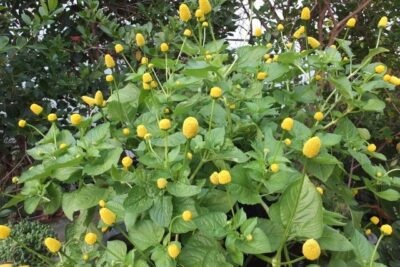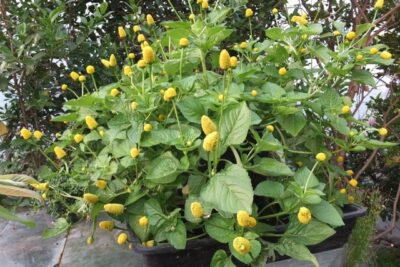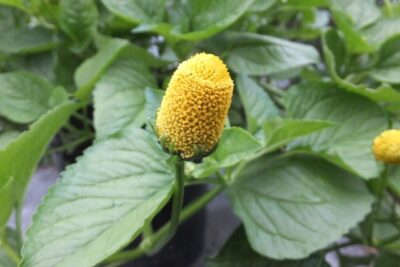
A lush foliage plant for a cool greenhouse Acmella makes a cascading mound of verdant foliage with almost non-stop production of cheery yellow pom-pom flower heads. Also known as the Electric Daisy, Alphabet plant, Australian cress, Para cress, Cresson du Brezil, Hoko So and Toothache plant, Acmella oleracea was originally Spilanthese acmella before moving from Compositae to Asteraceae. This is a monotypic genus, ie we’ve only introduced the one species into cultivation and oddly it’s widely known yet it’s doubtful where Acmella originated. Possibly it comes from South America or Australasia, though the Far East seems most likely as it’s used in Chinese medicine.

All these names in so many countries particularly the Tropics shows just how popular this has been for adding a zing to their salads. Both the foliage and more so the flower heads have a biting taste that peps up salads -when used in moderation. Held against a tooth or sore gum this stinging sensation akin to hot chilli also relieves pain thus the traditional use for toothache. However to be frank this ‘flavour’ does not greatly appeal to our blander western tastes in salads. Still it’s a gorgeously attractive plant, easy to grow, trouble free and a fascinating talking point.
As with so many this is best grown as an annual though technically a perennial as nursing it through dim drab winters is not easy and new plants from seed perform so much better. So sow in warmth in early spring, ideally singly in individual pots or cells, or as with tomatoes in a cluster to prick out individually as soon as the seedlings can be handled. I find Acmella looks best with three or five cascading from a tub, this also makes watering simpler as these are thirsty plants. Add a little feed once or twice weekly, otherwise these are carefree, with the possible exception of keeping an eye out for slugs and snails which may hole the foliage despite their zing.

The foliage is attractive from the start and the first flower heads pop out in a month or so from sowing then continuing in increasing numbers throughout summer into autumn only failing as the light levels fade. These yellow pom-poms persist remarkably long eventually fading when they can be dead-headed to keep the plants tidy. These flower heads have long stalks so can be included in posies and flower arrangements for their cheery yellow.










